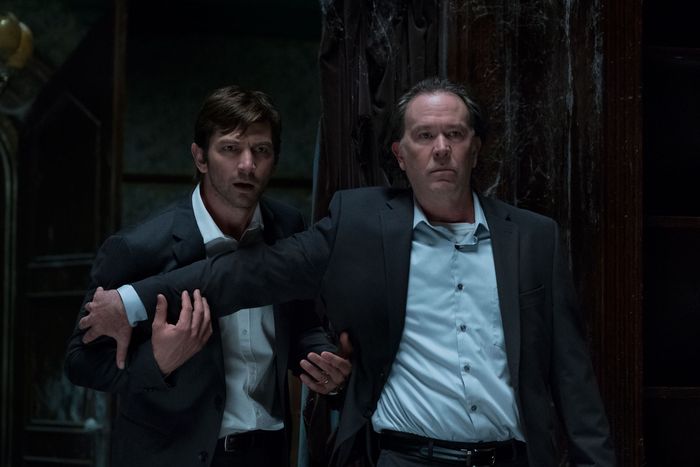
Pass the French fries, please, because I’m a little stymied by how to approach this one, and I hear they’re the cure for writer’s block. Part of me just wants to bellow “I’m DISAPPOINTED!” like Kevin Kline in A Fish Called Wanda. But it’s more complicated than that, so here goes.
As I reach for another Kleenex, it strikes me as pretty funny that when this series started, I was worried it wouldn’t be sad enough. At its heart, this is a show about a group of siblings who lose their mother — and a husband who loses his wife — under terrifying and confusing circumstances, and the havoc that wreaks on the lives of everyone involved. I spent a lot of time obsessing over whether Olivia was delusional to begin with or preyed on by the house, but in the end, the cause feels less important than the effects. It’s a credit to Mike Flanagan, as well as to each of the actors, that we wind up caring about these characters as much as we do. Except Steve. I still refuse to care about Steve.
After Nell’s homecoming in episode five, I should have realized that the house specializes not just in nightmares, but also in wish fulfillment. Finally admitted to the Red Room, which turns out to function as a Hogwarts-style Room of Requirement for the subconscious (which explains why the layout of the house feels so confusing), each of the siblings gets a rich dream sequence in which they confront something they feel guilty about. For Steve, it’s not wanting to have a child; for Theo, it’s a childhood crime; for Shirley, it’s a moment in her past that explains some of her erratic behavior over the last few episodes; for Luke, it’s his failure to rescue Joey. Only poor Hugh must remain on the outside, unwelcome at this particular family meeting. His own wish fulfillment will look different. (I still wish there had been more backstory about him and Olivia — a missed opportunity.)
“Fear and guilt are sisters,” Trish tells Theo. It’s one of the many lines in this episode lifted straight from the novel, a technique that doesn’t always work. (If someone says something that doesn’t quite sound like them, like “I will brew love potions for sad maidens,” you can assume it’s a quote pulled out of context.) In the show, grief is more powerful than guilt. When Steve says — as he did in the first episode and does again now — that a ghost is a wish, he means that it’s a wish for connection, for a bridge across time and space. (And why exactly does Steve deserve to be the authority on ghosts?) It’s by reforging their connections with each other, and their partners, that the Crain siblings are able to overcome their own ghosts.
It’s a consoling message. So consoling, in fact, that even the house doesn’t turn out to be quite as evil as it initially seems — at least not for some people, to whom it offers a certain morbid promise. (“It’s full of precious, precious things, and they don’t all belong to you,” Mr. Dudley tells Hugh.) It’s a brilliant plot twist, but it stops short of where it could go. In the novel, the hope the house offers Eleanor — the hope of coming home — is false. As we remember from its first paragraph, “Whatever walked there, walked alone.” When I heard the way the show’s ending alters that line, the words “Are you fucking kidding me?” escaped my lips. The show stares all the bleakness of death right in the face — and then pulls back. Go big or go home, I say.
In his review of the show for the Times, my friend Jason Zinoman expresses some reservations about the way Shirley Jackson was “erased” from it — indeed, it even includes a book called The Haunting of Hill House that is not by her. There are individual moments of tribute, such as a shot of young Theo reading a copy of The Lottery and Other Stories; and, of course, there’s a character named after her (rather ahistorically, too; in the 1980s, no one was naming little girls Shirley). You could argue that the whole show is a tribute to her, and Stephen King speculated on Twitter that she would approve of it. (Her eldest son, Laurence Jackson Hyman, served as a consultant.) I won’t go there.
My own take: I was deeply impressed by this series’ many ingenious moments and images, and, most of all, by the way it fearlessly probes the root of human sorrow, which is what all the greatest horrors must do. But I wish it hadn’t betrayed its own vision in the end.
Bent-Neck Ladies:
• I knew the name Harris had to be a sign that there was something wrong in that marriage. I just didn’t know it would be Shirley — or “Mrs. Harris,” as she’s called here.
• “The Grattan Murders” is a ballad that Shirley Jackson used to sing as a lullaby to her children. When I interviewed her, one of Jackson’s daughters sang it to me.
• Interesting twist at the end with Abigail. But were we told at some point that the Dudleys had two children? Who looks after her all day while Mrs. Dudley is working at Hill House? Annabeth Gish is great in the role, but this subplot is still full of inconsistencies.
• This is the building I believe Jackson used as a model for Hill House. The evidence is in my book.
Fear Factor: (1: The Mummy — 5: The Ring) 3

